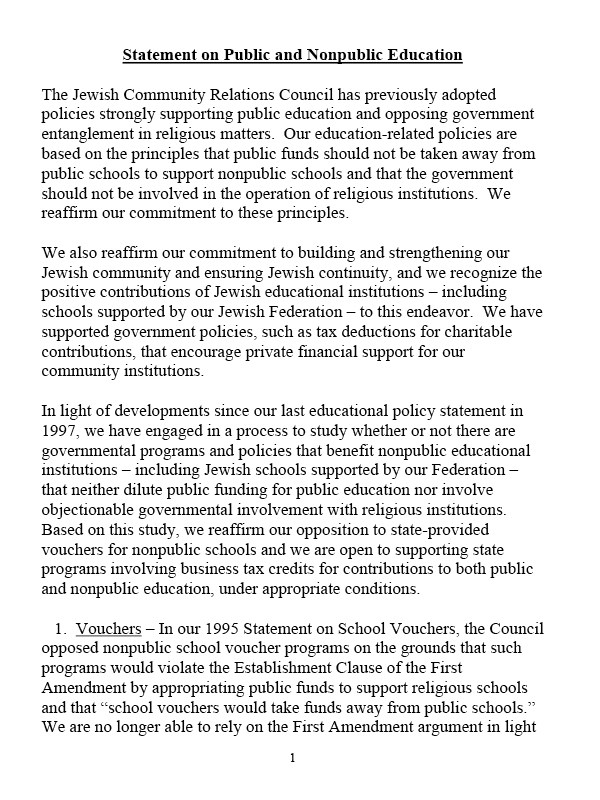Policy Resolution
November 9, 2011
The Jewish Community Relations Council has previously adopted policies strongly supporting public education and opposing government entanglement in religious matters. Our education-related policies are based on the principles that public funds should not be taken away from public schools to support nonpublic schools and that the government should not be involved in the operation of religious institutions. We reaffirm our commitment to these principles.
We also reaffirm our commitment to building and strengthening our Jewish community and ensuring Jewish continuity, and we recognize the positive contributions of Jewish educational institutions – including schools supported by our Jewish Federation – to this endeavor. We have supported government policies, such as tax deductions for charitable contributions, that encourage private financial support for our community institutions.
In light of developments since our last educational policy statement in 1997, we have engaged in a process to study whether or not there are governmental programs and policies that benefit nonpublic educational institutions – including Jewish schools supported by our Federation – that neither dilute public funding for public education nor involve objectionable governmental involvement with religious institutions. Based on this study, we reaffirm our opposition to state-provided vouchers for nonpublic schools and we are open to supporting state programs involving business tax credits for contributions to both public and nonpublic education, under appropriate conditions.
- Vouchers – In our 1995 Statement on School Vouchers, the Council opposed nonpublic school voucher programs on the grounds that such programs would violate the Establishment Clause of the First Amendment by appropriating public funds to support religious schools and that ―school vouchers would take funds away from public schools.‖ We are no longer able to rely on the First Amendment argument in light of the U.S. Supreme Court’s 2002 decision in Zelman v. Simmons-Harris, 536 U.S. 639, upholding school vouchers (even when most of the funds went to students attending religious schools) as not contrary to the Establishment Clause. Nevertheless, it remains true that school vouchers draw funds from public school budgets to enable parents to enroll their children in nonpublic schools. Such reductions in funding for public schools are detrimental to students and teachers in those schools, and we see no reason to alter our previous position opposing vouchers for that reason.
- Business tax credits for contributions to public and nonpublic schools -- An innovative program was adopted in Pennsylvania in 2001 to provide businesses with a state tax credit for a portion of their contributions to nonprofits offering scholarships to lower-income students to attend nonpublic schools, funds for educational enhancement programs in public schools and funds for professional development studies for teachers in both public and nonpublic schools. That program has resulted in substantial new private-source scholarship funds enabling lower-income students to attend Jewish schools in Pennsylvania and has received enthusiastic support from the local Jewish community. Business tax credit scholarship programs have been adopted in several other states, and legislation based on the Pennsylvania model – known as Building Opportunities for All Students and Teachers (BOAST) is being proposed in Maryland.
Constitutional issues -- Based on a number of Supreme Court decisions, we believe BOAST would not be held to violate the First Amendment. Relevant here, in addition to the Zelman case upholding the constitutionality of school vouchers, is Mueller v. Allen, 463 U.S. 388 (1983), in which the U.S. Supreme Court rejected the claim that allowing tax deductions for contributions to religious schools violates the Establishment Clause. Also relevant is Arizona Christian School Tuition Organization v. Winn, 563 U.S. ___, 131 S. Ct. 1436 (2011), in which the Court rejected a challenge to Arizona’s version of a business tax credit scholarship program on the grounds that petitioners lacked standing.
Policy issues – BOAST provides a positive benefit to public education and enhances public school funding by encouraging business contributions to support innovative public school enrichment programs and grants for teachers’ professional development. A substantial portion of the contributions generated by the program are targeted toward public schools and teacher professional development. Properly administered, BOAST’s provision of business tax credits for contributions to nonpublic school scholarship organizations would provide salutary benefits to our community without diluting funding for public education.
In order to conform to the basic principles that continue to underlie our education-related policies, we believe that any program providing business tax credits for contributions to nonpublic school scholarship organizations must be designed to add new money for education and not take away any money from public school budgets. Funding for the program must be allocated from general tax revenue or from non-education budgetary sources.
As with tax deductions for charitable contributions, tax credits for educational contributions reduce revenues for the general state treasury. This need not – and to merit Council support must not – in any way diminish public school appropriations. It is expected that, as has been the case in Pennsylvania and other states, the state government will establish a cap on the total amount of contributions eligible for a tax credit based on a prudent assessment of general treasury revenue needs. In addition, there should be a reasonable cap on the amount of each contributor’s donation that is eligible for a credit. We also would urge that, as in Pennsylvania, scholarship priority should be given first to low-income families and next on a sliding scale, based on financial needs. 4
There are a number of situations—including tax exemptions and Homeland Security grants for religious institutions, grants for community social service agencies, and charitable contribution tax deductions -- in which our Jewish community and other faith communities benefit from government policies and programs without government entanglement with religion. A properly administered business tax credit for contributions to public and nonpublic education, meeting the criteria outlined above, does not present a conflict between our commitment to support public education and our commitment to strengthening our Jewish community.
Adopted November 9, 2011
Jewish Community Relations Council of Greater Washington
Document
